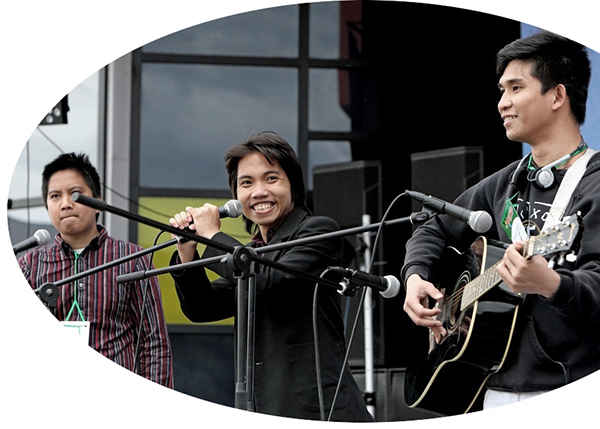Why are Filipinos good at singing?
Filipinos are often recognized for their exceptional singing abilities, a talent that stands out both locally and internationally. Several factors contribute to this phenomenon.

Cultural Influences
Rich Musical Heritage
The Philippines has a rich musical heritage influenced by various cultures, including indigenous, Spanish, American, and Asian traditions. Music is deeply embedded in Filipino culture, with traditional songs and modern music coexisting harmoniously.
Family and Social Gatherings
Singing is a staple activity in Filipino family gatherings and social events. Karaoke, in particular, is extremely popular, and it’s common for families to own karaoke machines. This frequent practice helps individuals develop their singing skills from a young age.
Religious Activities
The Philippines is predominantly a Christian country, and singing plays a significant role in religious activities. Church choirs and religious festivals provide many opportunities for Filipinos to sing, further honing their vocal abilities.
Educational System
Music Education
Music education is an integral part of the Philippine school curriculum. Students often participate in music classes, choirs, and school performances, receiving formal training that enhances their vocal skills.
Talent Shows and Competitions
The prevalence of local talent shows and singing competitions in schools and communities encourages young Filipinos to showcase and improve their singing talents. These events often lead to regional and national recognition.
Media and Entertainment
Influence of Filipino Media
Filipino media heavily features music, with numerous TV shows, movies, and radio programs centered around singing. This constant exposure inspires many to pursue singing as a hobby or career.
Popularity of Singing Competitions
Internationally known singing competitions, example: “The Voice,” “American Idol,” and “X Factor,” have seen many successful Filipino contestants. Their achievements inspire and motivate aspiring singers in the Philippines.
Genetic and Physiological Factors
Vocal Range and Tonality
Some studies suggest that certain genetic traits, example: vocal range and tonal quality, may be more prevalent among Filipinos. This natural ability, combined with cultural and educational influences, enhances their singing skills.
Community Support
Filipinos are known for their strong sense of community and support for each other’s talents. This encouragement helps budding singers gain confidence and improve their performance.
Examples of Famous Filipino Singers

Lea Salonga
Lea Salonga is a Tony Award-winning singer and actress, known for her roles in Broadway musicals – example: “Miss Saigon” and for providing the singing voice of Princess Jasmine in Disney’s “Aladdin.”
Arnel Pineda
Arnel Pineda rose to international fame as the lead vocalist of the rock band Journey. His discovery through YouTube showcases the global reach of Filipino singing talent.
Charice Pempengco
Charice, now known as Jake Zyrus, gained international recognition after appearing on “The Oprah Winfrey Show” and collaborating with renowned artists like David Foster.
Interesting Facts

- Karaoke Culture
The Philippines is often referred to as the “karaoke capital of the world.” Karaoke is a ubiquitous pastime, and many Filipinos have honed their singing skills through countless karaoke sessions.
- National Pride
Singing is a source of national pride in the Philippines. Successful Filipino singers often become national icons, and their achievements are celebrated throughout the country.
- Global Diaspora
The global Filipino diaspora has spread their musical talent worldwide. Filipino communities in countries like the United States, Canada, and the United Kingdom often form choirs and participate in local music scenes, further showcasing their singing prowess.
The exceptional singing talent of Filipinos can be attributed to a combination of cultural, educational, genetic, and community factors. Their rich musical heritage, supportive environment, and frequent practice all contribute to their remarkable vocal abilities.












